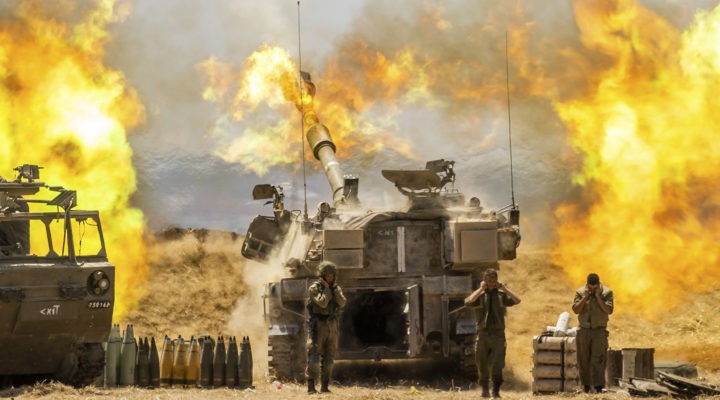Today, the Holy Land burns. The latest round of evictions of Palestinians from their homes in favor of the illegal Israeli settlement of the Occupied Territories predictably has led to violence which has, equally predictably, spiraled into death and destruction with no end to the violence, or the escalation, in sight.
These events have some thinking back to 2014 and the violence that wracked Gaza then. My thoughts turn even further back in time.
As a white college Republican enjoying the cramped comfort of a University of Georgia dorm room in the mid-1980s, I was blissfully unconcerned about apartheid. When I thought about it at all, my thoughts quickly dissolved into platitudes about the need to stand with the South African government against communist encroachments, or they were displaced by dispassionate musings about the role of human rights concerns in formulating American foreign policy. Then I heard the words. Really heard them: “The man is dead. The man is dead.”
I had discovered Peter Gabriel and his haunting anti-apartheid anthem, “Biko,” and had been inspired to learn more about Steve Biko, the anti-apartheid activist who was butchered by the South African government as part of “business as usual in Police Room six-one-nine.” As I listened and read, a sense of visceral horror awakened in me at the reality of a government and society in which the murder of a Black man for daring to demand to be treated like a human being could be viewed as casual. As ordinary. As mundanely routine.
Standing with the ‘other’
I since have learned to listen to other voices appealing not just to my humanity, but to my faith, demanding from me a commitment never again to stand silent in the face of such dehumanizing brutality. Listening still, I am now beginning to more fully appreciate the reality of a Christ whose entire life and ministry were marked by solidarity with the marginalized and the oppressed.
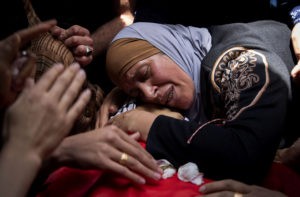
A Palestinian woman mourns over her son Rasheed Abu Arra, who was killed in clashes with Israeli forces, during his funeral in the Village of Aqqaba near the West Bank town of Tubas, Wednesday, May 12, 2021. (AP Photo / Majdi Mohammed)
I have become convinced there is no other place for a Christian to stand than with the “other” unless we want our prayers of “thy kingdom come” to be ignored as hypocritical blather by the God who created all human life as sacred — who formed it with God’s own hands and brought it to life with God’s own breath.
In particular, few things speak more clearly to my current understanding of what it means to be a Christian — a person who responds to God’s grace by actively and faithfully engaging in Christ’s kingdom work in the world — than does the Kairos Document. Created by a collaboration of South African clergymen and published in September 1985, the Kairos Document courageously condemned apartheid as heresy and called upon Christians worldwide to work for its end.
I have heard these voices and have taken them to heart. They will not let me stand silent in the face of Israel’s continued illegal occupation of Palestine. It is unjust. It is indefensible. It is apartheid.
This is apartheid
While the Israeli government lashes out at any suggestion that its treatment of Palestinians in the West Bank and Gaza can rightly be characterized as apartheid, facts are stubborn things.
“While the Israeli government lashes out at any suggestion that its treatment of Palestinians in the West Bank and Gaza can rightly be characterized as apartheid, facts are stubborn things.”
As defined by the International Convention on the Suppression and Punishment of the Crime of Apartheid in the early 1970s, apartheid consists of certain “inhuman acts committed for the purpose of establishing and maintaining domination by one racial group of persons over any other racial group of persons and systematically oppressing them.” According to the ICSPCA, such “inhuman acts” include steps taken to “divide the population along racial lines by the creation of separate reserves and ghettos”; the maintenance of a justice system marked by “arbitrary arrest and illegal imprisonment”; and the “deliberate imposition of living conditions” calculated to harm or destroy the oppressed people group.
As to the first of these “inhuman acts,” it is impossible to credibly dispute that the bantustans of South African apartheid have given way to the separation wall and military checkpoints of the Israeli system of hafrada in the Occupied Territories when speaking of a purposeful division of people along racial or ethnic lines. It is no accident that the terms “apartheid” and “hafrada” both mean separation. The languages of origin may be different. Little else is.
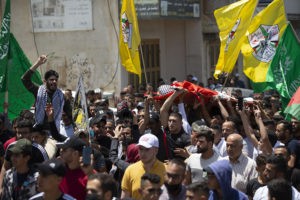
Palestinian mourners carry the body of Rasheed Abu Arra who was killed in the clashes with Israeli forces during his funeral, in the Village of Aqqaba near the West Bank town of Tubas, Wednesday, May 12, 2021. (AP Photo / Majdi Mohammed)
As to the second of these “inhuman acts,” Amnesty International has persisted in spotlighting the illegal detentions, and uses of torture and even lethal force, that mark purported efforts to maintain “law and order” by Israeli Defense Force occupation troops. By way of a single anecdote, as of December 2019, 186 Palestinian children were being held for indeterminate lengths of time as security detainees in Israeli prisons, denied access to a lawyer or even a parent during interrogation, and facing trial in special military courts.
Inhuman living conditions
It is the last type of these “inhuman acts,” though, that are sometimes less immediately discernible. They are no less unjust, nor are their consequences any less damaging. Simply put, Israel’s occupation of the Palestinian Territories offers a textbook example of the “deliberate imposition of living conditions” intended to harm or destroy Palestinians as a people group.
Unfortunately in this regard, the Israeli occupation has been marked by incidents that only can be fairly described as acts of environmental terrorism. For example, in the 1980s, a Geshurei Industries fertilizer and pesticide plant in Israel was shut down because of its chronic and severe violations of pollution laws. It was allowed to relocate to Israeli-occupied land near Tulkarm in the West Bank and to resume operation without restriction, subject only to an injunction that it had to pause operations whenever the wind was blowing toward Israel. As of 2010, many of the trees around Tulkarm had become decayed and rotted stumps, the land surrounding the plant had become completely incapable of use for agriculture, and the local Palestinian population was suffering from a dramatic surge in various illnesses including respiratory problems and eye infections.
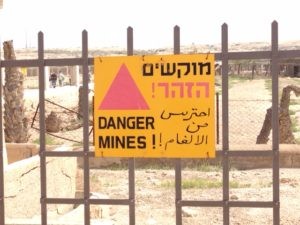
Sign photographed by the author on a trip to see the traditional baptismal place of Jesus in the Jordan River.
Perhaps most shocking of all is the damage caused Palestinians by Israeli control of the water supply in the Occupied Territories. In a 2009 study, the World Bank determined that, while Israeli settlers then constituted only 15% of the population of the West Bank, they were given 80% of the available fresh water supply. In short, 450,000 Israeli settlers were given access to more water than were 2.3 million Palestinians.
A call to stand with Palestinian Christians
In light of these and many other similar facts, the call of my faith to stand with the Palestinians is not faint. If I need a reminder of my calling, though, I need look no further than the Kairos Palestine Document — a 2009 manifesto created by Palestinian Christian leaders, echoing the sentiments of their South African brothers a quarter of a century earlier, standing bravely against the apartheid jointly faced by both themselves and their Muslim neighbors, and calling on their brothers and sisters in Christ around the world to lend their voices to their cries for justice.
Sadly, that plea seems to have fallen on deaf ears in terms of the majority of American evangelicals who, as a group, seem uniquely invested in viewing the Israeli occupation of Palestine as not only legal, but biblically mandated.
For example, a survey conducted by the Pew Forum on Religion and Public Life in 2004 revealed that religious belief and affiliation were largely determinative of most Americans’ political views about Israel and Palestine. When asked whether the United States should favor Israel over the Palestinians as a matter of foreign policy, those poll participants who self-identified as secular rather than religious largely rejected that notion, with only 23% approving and 51% disapproving of that idea. Among American Catholics and mainline protestants, those numbers stayed relatively unchanged, with only 31% of Catholics and 33% of mainline Protestants approving the premise that United States policy should deliberately favor Israel over the Palestinian people. Remarkably, however, 64% of poll participants who identified themselves as “traditional evangelical” approved of the United States deliberately and officially siding with Israel at the expense of Palestinians, with only 18% disapproving of that notion.
American evangelical disinterest in the plight of Palestinians stands wholly at odds with one of the truths voiced in the Kairos Palestine Document — the fact that the Israeli occupation of Palestine, and the economic and other harm worked thereby, has had a drastic and perhaps irreversible impact on Palestinian Christian communities.
“The Israeli occupation of Palestine, and the economic and other harm worked thereby, has had a drastic and perhaps irreversible impact on Palestinian Christian communities.”
A decade ago, almost 85% of the population of Bethlehem was Christian. Today, a Christian community that had survived and often thrived under centuries of Ottoman or Islamic rule has been decimated, with only 22% of the population in the town of Jesus’ birth remaining Christian. The fact that some Palestinian Christians now face backlash because of the very public support given the Israeli occupation by American evangelicals can only be expected to worsen the problem.
American evangelicals and the end times
This seeming disconnect becomes more understandable, if utterly contemptible, when it is realized that American evangelical support for the Israeli occupation has nothing to do with a desire to improve the current situation for the Jewish, Muslim and Christian people who call the Holy Land home. It has everything to do with speculative dispensationalist theology and a self-interested hope of speeding up the “end times.”
In this regard, a 2018 Lifeway Research survey of self-identified American evangelicals found that 80% believed the formation of the current Israeli nation-state and the “repopulation” of both Israel and Palestine by Jewish people “returning” from around the world was in direct fulfillment of prophesy and was bringing closer the return of Christ. For these American evangelicals, the goal is a shorter wait for the rapture, even if that means that the Jewish settlers whom they now purport to support will be forced to convert or burn forever in hell.
“The here-and-now ethical demands of the kingdom of God have been lost in Left Behind-fueled dreams of a distant heaven.”
While practicing a faith that calls for sacrifice of self for others, their Christian Zionist views speak to a different set of priorities. The here-and-now ethical demands of the kingdom of God have been lost in Left Behind-fueled dreams of a distant heaven.
To paraphrase Munther Isaac’s The Other Side of the Wall: A Palestinian Christian Narrative of Lament and Hope, a paradigmatic expression of a godless worldview is seen when powerful and privileged people build a wall between themselves and their powerless and destitute neighbors, and then justify their own selfish conduct by dismissing or even demonizing the unfortunate poor on the other side of the wall.
Hope from the other side of the wall
For people of power and privilege, the people on the other side of the wall are at best invisible and undeserving of consideration. At worst, they pose an existential threat. Such a view simply cannot be ascribed to Christ, or to those who would faithfully follow him.
With Jesus, we see an impulse to rip apart all the barriers erected by our selfishness and callousness, to preach good news to the poor, to announce release to the captive, and to stand hand-in-hand with those on the other side of the wall.
Despite the gloom that persists, I see rays of hope. Despite its critics and its flaws, the Boycott, Divestment and Sanctions movement is beginning to bring the type of economic pressure to bear on Israel that hastened the demise of apartheid in South Africa. And recent polling suggests an incremental, but discernible, lessening of unquestioning support for the Israeli occupation among younger American evangelicals.
“Surely the continued bloodshed is so repugnant to the shared Jewish, Muslim and Christian idea of the sanctity of human life that change must come.”
I do not know what the future holds. In particular, I do not know whether a “two-state solution” (in which a Jewish Israel shares a border with a separate and sovereign Palestinian state) is still possible, or whether Israel’s aggressive illegal annexation of the West Bank in recent years eventually will result in a “one-state solution” in which Israel and Palestine are combined into a single, secular, democratic, nation with both Jewish and Palestinian residents sharing equal rights and equal votes. I sense, however, that the current state of affairs cannot long continue.
Surely the continued bloodshed is so repugnant to the shared Jewish, Muslim and Christian idea of the sanctity of human life that change must come. Surely people of faith will awaken to the horrors of apartheid and of war, and finally hear their holy call to be peacemakers. To be kingdom builders, not heaven seekers.
What I do know is that the hope I have finds its voice in the heartfelt words that conclude the Kairos Palestine document: “In the absence of all hope, we cry out our cry of hope. We believe in God, good and just. We believe God’s goodness will finally triumph over the evil of hate and death that still persist in our land.”
To those beautiful words I would just add my own prayer, with one last nod to Peter Gabriel (who doesn’t seem to have strayed as far from his Christian roots and imagery as some suspect): “You can blow out a candle, but you can’t blow out a fire. Once the flames begin to catch, the wind will blow it higher.”
I pray that the flames are those of the Holy Spirit, working through the people of God to bring justice and peace where both are desperately needed, not the fires of war, fueled by greed, racism and self-interest.
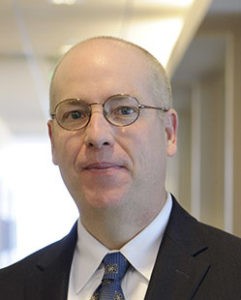
Chris Conley
Chris Conley is an attorney and graduate of the University of Georgia and of the Emory University School of Law. He and his wife, Mary, live in Athens, Ga., where both are members and deacons at First Baptist Church. They have one son, Aaron, who also is an attorney, and a miniature schnauzer, Oso, whose career path remains uncertain.
Related articles:
Trump’s Middle East peace plan makes sense until you read it, Christian peace activist says
Baptist convention denounces ‘oppression and violence’ toward Palestinians

